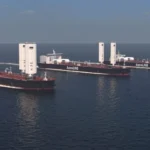Ocean Acidification And Climate Change

When we talk about climate change, the prominent focus is often placed upon the impact on wildlife and how an increase in global temperature results in wildly changing eco systems that are detrimental to the survival of certain species across the globe. But what about Ocean Acidification?
What is it all about?
While we are all in agreement that climate change does indeed see wildlife and their survivalist eco systems suffer, many forget about the shocking implications global warming has on our world’s rivers, streams, wetlands, and oceans.
For millions of years our world’s oceans and sees have retained a pretty balanced level of acidity, enabling it to be an eco-system able to support an abundance of marine life; from corals and marine plant life to fish migrations and the weird and wonderful creatures that survive on the depths of our sea beds, our oceans offer a delicate balance in which a web of life can thrive.
Unfortunately, since the start of the industrial revolution, humankind has been pumping some 150 billion tonnes of carbon dioxide into the world’s atmosphere with the oceans absorbing a mind blowing thirty percent of that.
Of course there are those who would suggest that this amount of carbon dioxide emission doesn’t have a detrimental effect on the vast waterways which cover the largest percentage of our planet however, scientific evidence suggests otherwise.
Ocean Acidification, sometimes referred to as OA, is the terminology used to describe the ever decreasing PH balance of our salt water oceans. As you can imagine, even the slightest increase in water acidity can spell major consequences for marine life, and as the oceans are so vast, the crushing impact acidification has cannot be localised to one specific region.
Absorbing up to half of the CO2 emissions created by burning fossil fuels, the tides are sadly turning for our wonderfully rich marine life, and with no signs of slowing down the acidity levels within our oceans is accelerating at an alarming rate.
Masters of our own destruction
As seemingly masters of our own destruction, we have become a society of consumers, living very rich lifestyles while paying little attention to the consequences on the world around us; a world in which we rely on to sustain and support us. It’s a frightening thought to think that by the end of the century our vibrant and awe inspiring seas will be full of nothing more than jellyfish and plankton, and that is simply down to small increases in water acidity.
Maintaining a regulatory PH balance is vital for the survival of marine wildlife and the plants which help preserve and protect this fragile environment, but with the oceans soaking up so much of our waste carbon emissions, every formidable creature and every breathing coral wall is under serious threat.
It could be argued that ocean acidification is nothing more than a natural process, a cycle however the rate at which ocean acidity is progressing suggests otherwise. Marine scientists have discovered that the acidification rate is approximately thirty times greater than that of a natural progression with PH levels dropping by 0.1 unit; a significant amount by anyone’s standards.
This unprecedented rise in ocean acidity has an unrivalled effect on calcium carbonate formation and as the main ingredient in sustaining many species reliant on this to grow their skeletons and protective shells, even the slightest shift in acidity trends can play a vital part in the development and future habits of essential marine life.
Experienced and knowledgeable scientist who have been studying the eco systems in our world’s oceans for decades have also made a startling discovery related to ocean acidification, and have identified a profound and cataclysmic issue which has set us on a perpetual loop of climate change destruction. Ocean acidification also seems to have a substantial impact on the amount of sulphur flowing in and out of our seas. Seeing a reduction in the mount of sulphur being thrown back into our atmosphere, science concludes that this in turn reduces the reflection of solar radiation back into space thus, causing further global warming.
Another aspect to consider when discussing the issue of ocean acidification is the everlasting impact of acid rain gently falling from our skies and into our sea waters. At a time when every tiny drop of extra acidity counts towards having serious implications on life beneath the ocean waves, we have to take serious action to deplete this acidic progression and become accountable for the enormous strain we are putting on our own life resources.
For decades our world’s oceans have been taking in our excess carbon emissions, absorbing and flowing in one continuous loop and as climate change continues to increase the temperature of our waterways, its hardy a surprise that marine life is already beginning to suffer.















